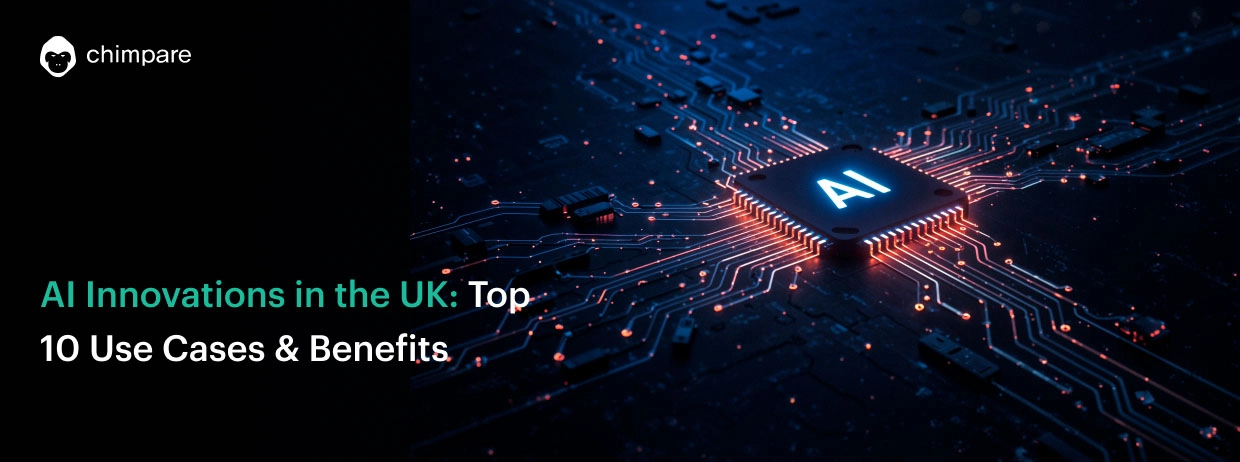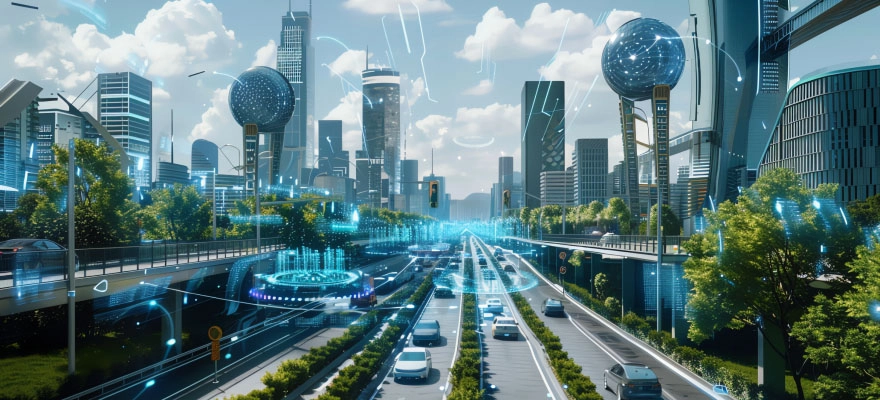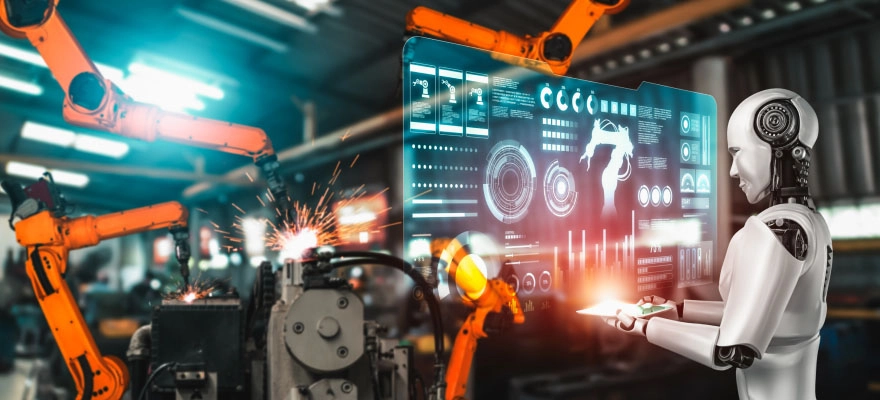AI Innovations in the UK: Top 10 Use Cases & Benefits

Table of Contents
AI technology has burst into our reality, a dynamic force rewriting industry rules worldwide. AI use cases and at the forefront of this revolution?
The UK is becoming increasingly pioneering. Forward-looking government backing, a lively tech scene, and excellent research facilities are helping the UK to lead the way and secure its position as a world innovation hub.
There’s nothing quiet about how AI innovations are moving from the laboratory to become part of daily life in the UK popping up everywhere from how to accurately diagnose a medical condition, to shopping recommendations tailored to users, and helping make city living easier.
It’s no accident that this penetration is so wide; it’s a sign of how committed a nation is to using AI to drive progress, manifest in an explosion of homegrown start-ups, strategic investments and game-changing partnerships across public and private sectors.
Step beyond the hype and into the tangible: this blog is your exclusive pass to unlock the UK’s top 10 AI use cases. We will delve into how these game-changing technologies are disrupting major sectors, bringing tangible results and shaping the AI future in Britain.
Whether you’re a business leader shaping new businesses and policies, an investor evaluating the impact on tech powered products and services, a disruptor thinking about the implications and opportunities, or a gadget-lover who needs to understand real-world use cases, this is the only book you’ll need to read to learn what AI technology means for your life.
Benefits of AI in UK
AI innovations is turning the UK on its head. It’s not science fiction anymore. We see it as a tool to help people make better decisions, work more efficiently, and to make life easier for people in healthcare, agriculture, banking, e-commerce and other industries. So let’s look at some of the main ways the UK stands to gain from AI.
- Boosts Business Efficiency
AI enables companies to automate repetitive tasks, process large volumes of data and offer better service to customers via chatbots and virtual assistants. - Improves Healthcare Services
The UK’s healthcare system is becoming faster, more accurate, and patient-friendly, from early disease detection to personalised treatment plans and AI-powered medical imaging. - Strengthens Financial Security
AI tools of fraud detection systems and risk management tools help banks and financial institutions protect customers and detect suspicious activity in real time. - Promotes Smarter Farming
Farmers in the UK use technology, including precision agriculture, AI-powered drones and automated soil monitoring to boost crop yields and reduce pollution. - Enhances Public Safety
AI is also applied in public safety sectors, including smart surveillance, emergency response, and crime prediction, to keep the community safer. - Supports Clean Energy Solutions
AI fine-tunes energy grids, predicts energy needs and aids in more efficiently administering renewable sources such as wind and solar. - Improves Transport and Logistics
From AI-powered traffic management systems to autonomous delivery vehicles, transportation in the UK is becoming faster, safer, and more efficient. - Creates New Job Opportunities:
Even as AI takes away empirical jobs, the increase in AI requires new jobs such as AI developers, data analysts, cyber security specialists and digital transformation engineers. - Enables Personalised Shopping Experiences:
Retail firms employ AI to deliver personalised product recommendations, optimise inventories and enhance customer satisfaction. - Contributes to Environmental Protection:
AI models help predict natural disasters, monitor air and water quality, and design eco-friendly solutions for a cleaner, greener UK.
Don’t Just Read About AI! Make It Work for You!
Let’s build something incredible together.
Top 10 Use Cases & Their Benefits
Explore the top 10 AI use cases revolutionising industries across the UK. Discover how these AI benefits innovations bring real benefits, from more competent healthcare to safer financial systems.
1. AI in Financial Services

Fraud prevention is among the banking sector’s primary uses of artificial intelligence. Since fraud detection methods depend on predefined rules, they might not match crooks’ changing strategies. Driven by AI research, though, systems constantly learn from transaction patterns and anomalies.
Another essential use case is in customer service automation. Today, a considerable share of customer questions are being handled by AI-powered chatbots and virtual assistants.
Barclays has unveiled Clyde, an AI-powered chatbot that allows users to monitor balances, track purchases, and receive daily financial support 24/7 without human interaction.
AI is applied in wealth management to generate customised investment suggestions based on individual risk tolerances, financial objectives, and market circumstances. By recommending customised portfolios, digital platforms like Nutmeg and Moneyfarm help open investment possibilities to regular consumers using AI.
Benefits:
- Improved fraud detection accuracy
- Faster, 24/7 customer service
- Personalised financial advice
- Reduced operational costs for banks
2. AI in Agriculture

High-tech AI innovations isn’t often associated with farming, but the sector is utilising it to its full potential in the UK. Farmers increasingly use AI drones, data analysis, and machine learning techniques as precision farming gains traction.
AI tools is likewise altering farmers’ predictions of agricultural production. AI systems estimate crop yields by analyzing data from weather sensors along with satellite imagery and historical harvest records.
When farmers efficiently manage their pesticides, fertilisers and water resources they can achieve better crop quality along with sustainable farming methods.
AI also helps with other things besides crops. Livestock farming is getting a boost, too. Smart sensors and image recognition tools monitor animals’ health and behaviour. If there’s a change in how they’re eating, moving, or even their body temperature, farmers get an early warning and can act fast to prevent bigger problems.
Benefits:
- Higher crop yields with optimised resource use
- Early disease detection in plants and animals
- Reduced waste and environmental footprint
- Data-driven decision-making for farmers
3. AI in Retail

UK retailers are turning to artificial intelligence in brick-and-mortar stores more than ever, especially now, when faced with heavy online competition and changes in consumer needs. AI innovation in retail simplifies jobs such as inventory management and reduces the in-store and online shopping process.
AI can forecast requirements by analysing seasons, promotional events, historical sales, etc., helping retailers maintain the proper inventory levels and avoid problems like overstocking or running out of stock. It provides real-time information about availability and delivery schedules for when products are needed and must be restocked.
AI applications include self-service checkouts and tracking store inventory levels. Some supermarkets test cameras and sensors that observe product flow and automatically update inventory.
Benefits:
- Highly personalised customer experiences
- Improved inventory management and reduced waste
- Enhanced logistics and supply chain visibility
- Increased sales through targeted promotions
4. AI in Energy

With sustainability and carbon reduction as the UK’s leading priorities, AI is more critical in better managing energy and fostering renewable energy sources. This involves private energy companies, government initiatives, and more. All are adopting AI to become smarter in distributing energy, making forecasts, and managing infrastructure.
AI algorithms can analyse factors like weather patterns, consumption trends, and the capacity of the grids to distribute energy optimally in real time. Such distribution would entail no energy wastage and a more stable supply, especially during peak periods.
In residential and commercial properties, smart meters and home management systems powered by AI optimise energy consumption. They achieve this by adjusting heating, cooling, and lighting according to occupancy and time of day.
Benefits:
- Reduced carbon footprint
- Optimised energy consumption and distribution
- Lower operational costs for energy providers
- Enhanced grid stability
5. AI in Healthcare

Healthcare is a field that is seeing great success and impact from AI innovations in the UK. AI is revolutionising patient care, from increased diagnostic precision to better hospital resource management and customised treatment regimens.
AI in health care, like Babylon Health, provides virtual consultations by looking at patient symptoms and medical history to give a first diagnosis and treatment recommendations. This, in turn, puts less strain on NHS services and increases access to health care.
In pharmaceutical research, which is at the forefront of drug discovery, AI is used to identify what may become effective drugs by analysing large sets of molecular and clinical trial data. Exscientia is leading this AI research in the UK.
Benefits:
- Faster and more accurate disease diagnoses
- Improved patient triaging and hospital efficiency
- Accessible healthcare through AI chatbots
- Accelerated drug discovery and clinical trials
6. AI in Smart Cities

The UK is entering the smart city arena. It’s all about using AI innovations to boost transportation, keep us safe, and better manage the environment. London, Manchester, and Bristol are at the forefront of this exciting change.
Take waste management, for instance. They’ve got these clever systems that use AI tools like sensors to monitor bin capacity. It’s pretty neat! This way, they can plan collection routes more efficiently, which means less fuel consumption and lower carbon emissions.
And then there’s the lighting, which is interesting too. They’ve introduced smart streetlights that adjust their brightness depending on foot traffic and the roads’ busyness. Both improved public safety and more efficient energy use are advantageous.
Benefits:
- Decreased pollutants and traffic jams
- Enhanced public safety and emergency response
- Efficient waste management
- Lower operational costs for city councils
7. AI in Manufacturing

Manufacturing remains rather vital for the British economy. AI is undergoing considerable transformation in factories. Once producers begin employing artificial intelligence on their production lines, it is like flipping a switch; they may operate more efficiently, minimise downtime, and save costs. Seeing its influence is just incredible.
Predictive maintenance is one interesting application of AI. Generally, maintenance occurs on a regular schedule or when something breaks, even if it is not required.
But with AI tools, sensors track machines continuously. Therefore, teams can spot probable component failure. This enables them to solve problems before they result in any downtime.
AI assesses data from many sources, including machine operations, supply chains, and market demands, to help with production planning and inventory management. Often employed for hazardous or repetitive tasks, cobots (robots operating alongside people) enable the development of safer and more uniform workplaces.
Benefits:
- Minimised unplanned downtime and repair costs
- Enhanced product quality and consistency
- Safer working environments
- Streamlined supply chain and inventory operations
8. AI in Education

AI is changing the way we manage inventories and production scheduling. Examining information on supply networks, market demand, and machine performance helps establish the ideal manufacturing schedules.
In the UK, schools are going through a digital shift, with AI added to teaching, learning, and admin tasks. This tech makes education more personal and accessible for both students and schools.
Through AI chatbots and virtual tutors students can request details about their assignments and campus events to enhance their educational experience.
Teachers can focus more on teaching and helping students when AI takes charge of repetitive administrative tasks.
Benefits:
- Personalised, student-centric learning paths
- Quicker, data-driven academic feedback
- Automated administrative tasks
- Increased student support and engagement
9. AI in Customer Service

UK customer service activities now depend heavily on AI technology to help companies achieve outstanding customer experiences. Organizations are now implementing AI technologies including chatbots and recommendation systems to interact with their customers.
Call centres deploy AI with sentiment analysis to achieve accurate responses and improve service quality. This gives human agents real-time prompts and assists in identifying customer emotions during discussions.
Benefits:
- 24/7 customer support availability
- Faster query resolution and reduced waiting times
- Improved customer satisfaction and loyalty
- Lower operational costs for businesses
10. AI in Fraud Prevention

In the UK, a surge in digital transactions raises the risk of fraud and cybercrime. Fortunately, artificial intelligence helps maintain security by catching fraud before it damages our financial systems.
Banks and fintech firms are using machine learning to examine transaction history, spending patterns, and user behaviour as they happen. The system flags or immediately prevents the transaction if something seems unusual, such as a significant withdrawal from an uncommon location.
These artificial intelligence solutions also help companies comply with the law by identifying possible money laundering operations and ensuring organisations adhere to strict financial regulations.
Benefits:
- Real-time fraud detection and prevention
- Enhanced customer trust and security
- Reduced financial losses from cybercrime
- Compliance with financial regulations
Conclusion
The British are building AI and using it for good, whether in farming, smart cities, health care, or finance. With AI research and implementation, it makes businesses run more efficiently, customer service more effective, and companies able to tackle challenging societal problems.
Enterprises of all sizes should explore AI technologies to stay relevant and lead their industries. Artificial intelligence seems well-placed to play a significant role in the UK’s digital future by working with the government, industry, and academia.
There is also the massive promise of AI down the road. New areas, such as AI ethics, explainable AI, and using AI to combat climate change, are also beginning to catch on. These areas address significant challenges while ensuring AI is safe, transparent, and fair.
Organisations of every size should consider AI solutions to stay on par with and even ahead of their markets. Government, business, and academia are joining to make AI a driving force in building the UK’s digital future.
FAQs
Yes! AI is in high demand across the UK, with businesses and public sectors rapidly adopting it to improve services, cut costs, and stay competitive.
AI will help build smarter cities, improve healthcare, modernize transport, and boost business innovation making everyday life more efficient and connected.
The UK’s top AI adopters include healthcare, finance, retail, agriculture, transport, and energy, with AI helping improve efficiency, safety, and customer experiences.

Samuel Meleder
Samuel Meleder founded Chimpare, a global company that builds software solutions. With a passion for innovation and a commitment to helping businesses grow through smart digital strategies, Samuel leads a global team delivering cutting-edge solutions across industries
Found this post insightful? Don’t forget to share it with your network!
Related Articles
Top 10 Mobile App Development Companies in 2026 Worldwide?
Mobile apps have silently subsumed almost every element of our everyday existence. Handling everything from food orders and cab booking to business

Why Choose Cross‑Platform App Development for Your App?
Consider a wonderful app idea you have. You have envisioned every other element that will have clients love it: the

How Can You Create an Android App Step by Step Successfully?
Have you ever given the process of creating the apps you use daily any thought? Like Instagram’s sophisticated camera tools,
